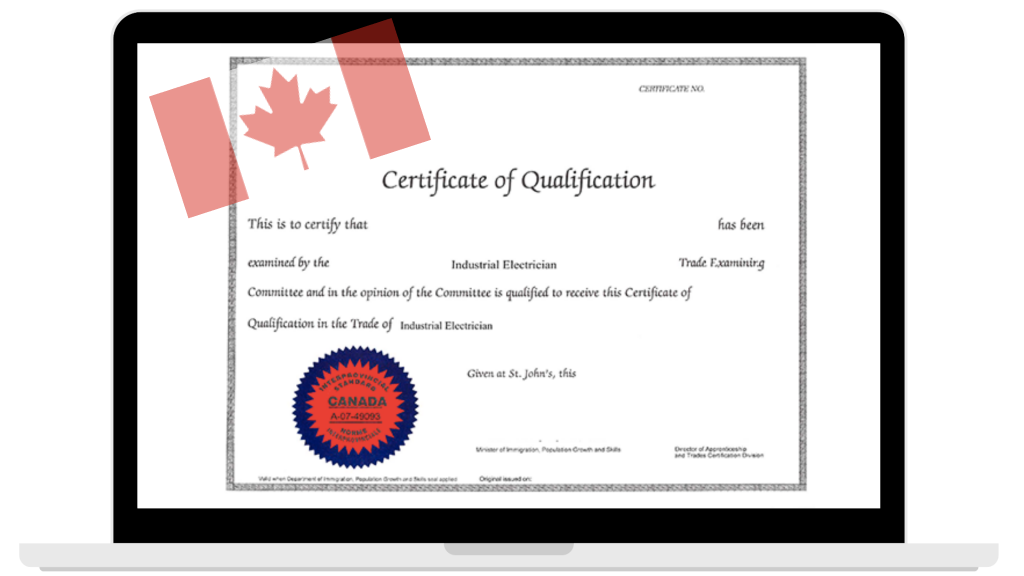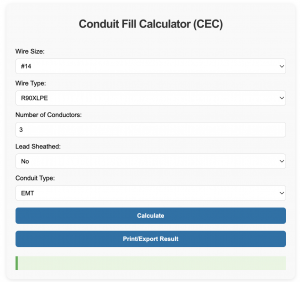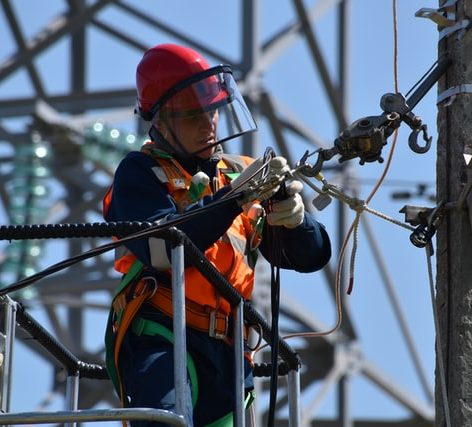The C of Q, short for Certificate of Qualification, is a provincial trade certification in Canada. It is the standard of quality for tradesmen and is usually legally required for professionals.
It is issued by provincial or territorial government authorities, such as Skilled Trades Ontario in Ontario
It also contributes to the Express Entry Comprehensive Ranking System (CRS), granting up to 50 additional points, which greatly increases immigrants’ chances of getting permanent residency.
It typically requires students to do an 8000+ hour apprenticeship, and sit an exam or a series of exams.
After gaining your C of Q, you are entitled to work without supervision and pull the necessary permits to conduct an electrical installation. It is therefore crucial for any electrician working in Canada.
Which Trades Use a C of Q?
The list of C of Q trades is long and varies by province. It is divided into compulsory trades, where a C of Q is necessary to legally work, and non-compulsory.
Here are some examples of C of Q compulsory trades:
- Electricians (construction, maintenance, industrial)
- Plumbers
- Refrigeration and Air Conditioning Mechanics
- Welders
- Steamfitters and Pipefitters
- Gasfitters
- Heavy Duty Equipment Technicians (in some jurisdictions)
For electricians, there are a few options of C of Q trades. Here’s a breakdown by province and governing body:
Ontario- Skilled Trades Ontario:
- Construction and Maintenance Electrician (previously known as the 309A)
- Industrial Electrician (previously known as the 442A)
- Residential Electrician
- Instrumentation Electrician
Find more about Skills Trades Ontario here.
Alberta- AIT (Apprenticeship and Industry Training):
- Electrician (construction and maintenance combined)
- Industrial Electrician
- Powerline Technician (sometimes linked to electrical trades)
Read more here.
British Columbia- ITA (Industry Training Authority):
- Construction Electrician
- Maintenance Electrician
- Industrial Electrician
- Residential Electrician (in some cases)
Visit the ITA site here.
Quebec- Emploi-Québec / CCQ (Construction Commission of Québec):
- Électricien (Construction and maintenance grouped)
- Électricien industriel (Industrial Electrician)
- Électricien en basse tension (Low voltage electrician)
Visit the CCQ site here.
Mainly, the paths available are industrial, construction, and residential. There is also the instrumentation path that could be helpful to some electricians.
We’ve written an in-depth article on the C of Q certification for construction electricians in each province, which can be read here.
How to get C of Q certified

The process varies from province to province, but usually follows the same basic outline: meet the education requirements, complete an apprenticeship, pass your exams, and become qualified.
If you are coming from a different province or country, you may need to take a Trade Equivalency Assessment before writing your exam.
The exam varies from province to province, with some provinces aligning with the red seal, the interprovincial certificate, and others maintaining their own curriculum.
In Ontario, for example, the exam will have 100-150 multiple-choice questions, and the passing grade is 75%.
C of Q vs Red Seal vs Master Electrician – What’s the Difference?
C of Q vs Red Seal
The Red Seal is an interprovincial certification that you would usually get after completing the C of Q. However, in some provinces, such as Ontario, the Red Seal is now automatically given to students who pass the C of Q.
C of Q vs Master Electrician
The Master Electrician certification is a separate certification that enables you to lead electrical projects and supervise electrical installations. Like the C of Q, it is administered by the provincial government entities. In Alberta, for example, the Master Electrician designation is managed by The Safety Codes Council. It typically requires having the C of Q and passing another exam.
It basically sits “on top” of the C of Q, and allows you to manage projects and teams.
Frequently Asked Questions About the Certificate of Qualification in Canada
Do I Need a Certificate of Qualification to Work as an Electrician?
For most Canadian provinces, yes, it is required to have a C of Q. In some provinces, such as British Columbia, Yukon, the Northwest Territories, and Nunavut, trade certification remains non-compulsory.
Can I Work in Another Province with My C of Q?
Yes, if your certificate is Red Seal endorsed, then you can work in another province without having to do any paperwork. If it isn’t, you will need to contact the local certification authority and have your certificate formally recognized.
Is the C of Q the Same as a Journeyman Status?
In short, yes. Technically, the C of Q is the final step of attaining your journeyman status, but in practice, the terms “C of Q holder” and “journeymen” / “journeyperson” can be used interchangeably. When you obtain your C of Q, you can call yourself a journeyman.
Does the C of Q need to be renewed?
Yes, most C of Q certifications need to be renewed; however, the renewal requirements and frequency vary from province to province:
- In Ontario, for compulsory trades, the C of Q must be renewed annually to remain valid.
- In Quebec, renewal depends on the trade and certificate type, with renewal notices sent before expiry. The certificate remains valid for up to four years after re-issuance, and if a certificate expires for more than six years, new exams or retraining may be required.
- Nova Scotia and some other provinces have eliminated mandatory C of Q renewals for many trades to reduce administrative burden, meaning some certificates no longer expire or require renewal except for specific trades like Blasters.
- British Columbia issues some Certificates of Qualification without expiry dates but may require annual practice fees or other conditions to maintain validity.
What is the typical cost for obtaining the C of Q?
Typical costs range from $100–$250, depending on the province.
Will the C of Q help in obtaining an ITA for permanent residency?
It sure does. If you complete a C of Q in an eligible trade, and you pass language thresholds (CLB 7 or higher in all four Canadian Language Benchmark abilities), you can get up to 50 additional points.
Can the apprenticeship done during the C of Q count towards arranged employment?
No, “arranged employment” is only considered for employment offers that extend to a period of at least 1 year beyond the permanent residency approval. Assuming you are taking your C of Q before getting residency, the apprenticeship will not count.
Is the C of Q the same as a contractor license?
No. The C of Q will allow you to pull permits and manage projects within a company or project, but it will not allow you to act as a contractor. The contractor license requirements vary from province to province but usually require business registration, exams on regulatory compliance, liability insurance, and, in some cases, a separate exam focused on safety regulations and business management.
Final Thoughts
In summary, the C of Q is a must-have for anybody who is serious about a career in the trades in Canada. It’s even more important if you’re an immigrant working towards getting permanent residency.
In our courses, you’ll find thousands of preparation courses and modules to help you pass your C of Q exam. So feel free to browse our free content and reach out with any questions you might have.




